US Army bans use of popular app TikTok over security concerns
The U.S. Army has banned soldiers from using the popular social media app TikTok amid concerns about national security and the app’s handling of user data.
The addictive music-video app, owned by Chinese startup ByteDance Technology Co., is surging in use among children, according to Atlanta consumer adviser Clark Howard.
“It is considered a cyber threat,” said Army spokeswoman Lt. Col. Robin Ochoa, according to news reports. “We do not allow it on government phones.”
The new Pentagon directive, first reported Monday by Military.com, is a significant policy reversal.
Before now, the Army had been using TikTok in conjunction with other social media apps as tools to reach out to young recruits.
That all changed in late October, when Sen. Tom Cotton, R-Arkansas, and Sen. Chuck Schumer, D-New York, reached out to acting director of National Intelligence Joseph Maguire, urging him to investigate whether TikTok represents a national security risk. The senators described the app as a “potential counterintelligence threat we cannot ignore.”
I’m glad the Army is taking the potential national security risks posed by TikTok seriously.
— Chuck Schumer (@SenSchumer) December 31, 2019
China-owned technology companies’ collection and handling of user data, location-related data, and other sensitive personal information should concern us all.https://t.co/dPQkisq3t2
By late November, U.S. Army cadets were instructed not to use TikTok for recruitment, while in uniform or while performing official duties. They could, however, continue to use the app during personal time.
The U.S. Navy was the first of the military branches this month to order its troops to cease use of the app, according to reports.
In mid-December, the Army also ordered its personnel to stop using the app on all government-owned phones.

The Defense Department put out a Cyber Awareness memo directing all employees to “be wary of applications you download, monitor your phones for unusual and unsolicited texts etc., and delete them immediately and uninstall TikTok to circumvent any exposure of personal information,” Military.com reports.
Applications such as TikTok are coming under more intense scrutiny and suspicion in the United States as the shadow of foreign interference looms over the approaching 2020 election.
A warning to share with your family & friends:
— Chuck Schumer (@SenSchumer) December 2, 2019
This year when millions were downloading #FaceApp, I asked the FBI if the app was safe.
Well, the FBI just responded.
And they told me any app or product developed in Russia like FaceApp is a potential counterintelligence threat. pic.twitter.com/ioMzpp2Xi5
Last summer, concerns about the Russian-based FaceApp, which allows users to age themselves, grew as rumors circulated that foreign developers were collecting user photos and data.
»RELATED: Russian mobile apps pose ‘counterintelligence threat,’ FBI warns
The Democratic National Committee sent a security alert to 2020 presidential candidates warning against using the app.
TikTok was listed at No. 4 on the most recent list of the most popular free iPhone apps on the Apple App Store.
The Beijing-based company, led by Chief Executive Officer Yiming Zhang, is said to be weighing a range of options to address U.S. security concerns, according to Bloomberg News.
“We are not influenced by any foreign government, including the Chinese government; TikTok does not operate in China, nor do we have any intention of doing so in the future,” the company said in a statement in October.
More Stories
The Latest

